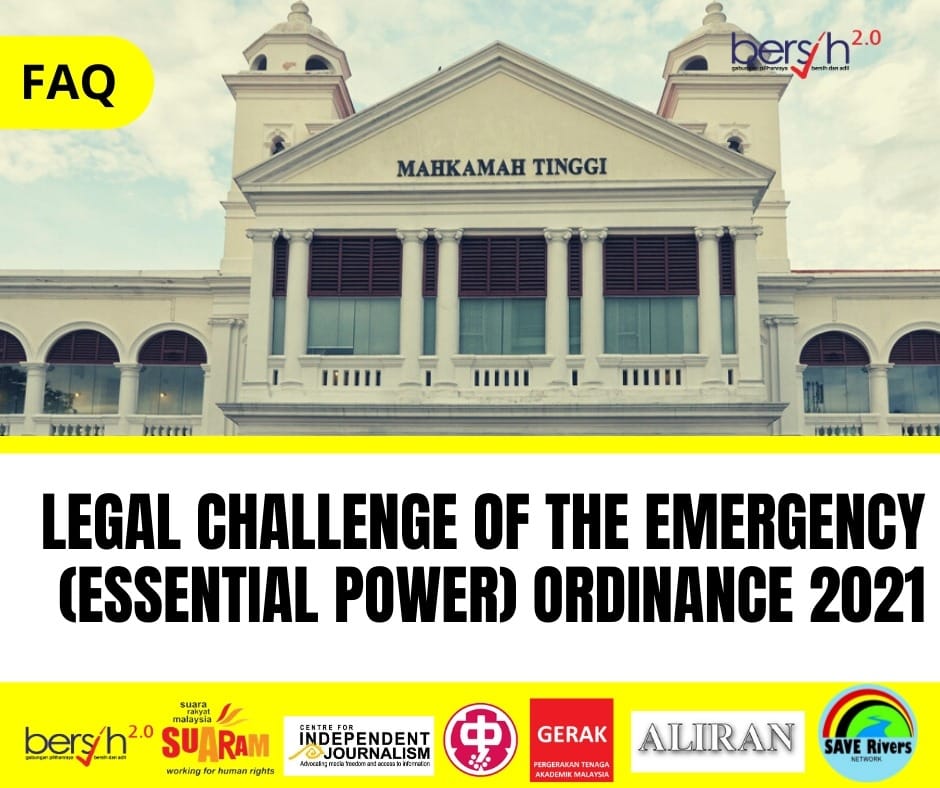Frequently asked questions [FAQ]
1) Why file a legal suit?
The Emergency grants arbitrary and unfettered powers to one arm of the State – the Executive – and undermines our constitutional rights and the peoples’ fundamental freedoms. The Government can do anything it wants by making any number of Emergency Ordinances.
It is also the first time that Parliament and State Assemblies’ sittings have been suspended by passing of the Emergency (Essential Powers) Ordinance 2021 (EO). The suspension will have an adverse impact as our elected representatives cannot play their “check and balance” role. Parliament and State Assemblies represent the people and this arm of the State is a basic feature of our Federal Constitution. The EO disables a fundamental institution and silences the people.
In promoting public participation, rule of law and good governance, we as citizens must monitor and hold the Government accountable for its actions in order to restore our trust in participatory democracy. We must claim our rights and space to express our diverging positions and interests without harm or reprisal. There can be no derogation of our constitutional and fundamental human rights as the peoples of Malaysia.
Therefore, this legal suit is filed to uphold the “rule of law” in the public interest. We seek the Judiciary’s guidance on whether the Government’s EO is lawful or otherwise. It will benefit all Malaysians to know the answer one way or another.
2) What are we expecting out of this legal suit?
We are expecting a determination, in summary, that first, the court has the power to review any attempt by the Government to frustrate the constitutional safeguard requiring that emergency ordinances be debated and voted in Parliament. Second, that that the EO be declared invalid.
3) Are we challenging the powers of the Yang di-Pertuan Agong (YDPA)?
Adakah kami sedang mencabar kuasa Yang di-Pertuan Agong (YDPA)
No. We are seeking declarations that require the Judiciary to interpret Article 150 of the Federal Constitution and to give its opinion. We are not challenging the powers conferred on the YDPA to call for an Emergency on the advice of the Prime Minister.
4) Article 150 (8) of the Federal Constitution says that the emergency proclamation and related ordinances are final and cannot be challenged in any court or on any ground. Why are CSOs proceeding with the legal suit?
We firmly belief that the basic structure of the Federal Constitution equates equal powers to all branches of the State. This means that the Legislature and Judiciary, respectively, have equal oversight roles to play in providing the necessary checks and balances. Article 121 of the Federal Constitution gives the Judiciary inherent powers and jurisdiction to hear all cases brought before it. It is a basic feature of the Constitution.
As such, Article 150 (8) that purports to oust the courts’ powers and jurisdiction is unconstitutional, and thus null and void.
We are seeking a judicial determination on this issue as well.
5) Would the legal suit lead to the lifting of the Emergency?
The reliefs which are being sought are declarations on the constitutionality of the EO. If we succeed, the Government is bound to respect and follow the court’s order. This means that the EO would be declared null and void. It is then up to the Government on how it wishes to act in relation to the Proclamation of Emergency.
6) Do we as CSOs have the standing to initiate a legal action (locus standi)?
Adakah kami sebagai CSO ada hak untuk memulakan tindakan undang-undang (locus standi)?
We believe we do. This is a “rule of law”, public interest litigation. The Emergency affects everyone and it is an extremely drastic measure that has been taken by the Government. As CSOs working towards strengthening parliamentary democracy and protecting civic spaces in Malaysia, our role as watchdogs and activists have been severely undermined with the imposition of the Emergency Ordinance. The suspension of Parliament will impact the progress made towards legal reforms as the debates and voting on laws cannot proceed.
As such, we believe we have the legal standing to seek clarity from the court on whether suspending Parliament and State Assembly sittings, through the Emergency Ordinance, is constitutional, as such decisions directly impact our work.
From,
1. The Coalition for Clean and Fair Election (BERSIH 2.0)
2. Suara Rakyat Malaysia (SUARAM)
3. Center for Independent Journalism (CIJ)
4. Aliran
5. The Kuala Lumpur and Selangor Chinese Assembly Hall (KLSCAH)
6. Pergerakan Tenaga Akademik Malaysia (GERAK)
7. Save Rivers


 中文
中文 BM
BM